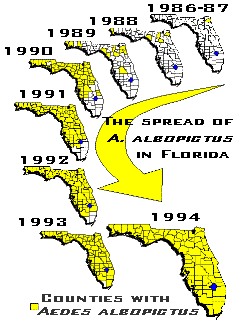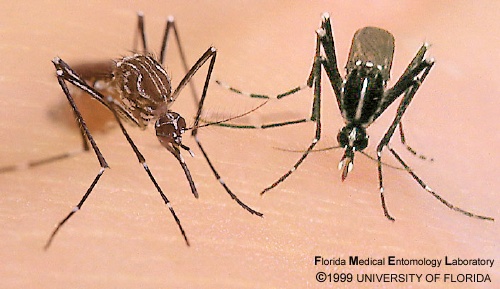Invasion Biology of Aedes albopictus
The Asian Tiger Mosquito, first discovered in Florida at a scrap tire dump in Jacksonville in 1986,  subsequently spread rapidly to become the most common daytime pest mosquito biting man in the State. This same invasive species has been recently incriminated as a transmitter of LaCrosse encephalitis virus to man elsewhere in the southern USA, and during the West Nile epidemic of 2002, eleven states and the District of Columbia reported the detection of this virus in field-collected A. albopictus.
subsequently spread rapidly to become the most common daytime pest mosquito biting man in the State. This same invasive species has been recently incriminated as a transmitter of LaCrosse encephalitis virus to man elsewhere in the southern USA, and during the West Nile epidemic of 2002, eleven states and the District of Columbia reported the detection of this virus in field-collected A. albopictus.
FMEL is the home base of an NIH-funded research program on A. albopictus invasions, conducted in collaboration with researchers from Illinois State University and the Oswaldo Cruz Institute in Brazil. Current research activities include:
- experimental tests of hypotheses about the roles of interspecific competition with resident species (such as Aedes aegypti, the Yellow Fever Mosquito) in determining invasion success.
- examination of the effects of larval competition on vector competence of A. albopictus and A. aegypti for dengue and other arboviruses.
- experiments to elucidate the impact of larval predation on A. albopictus in aquatic container communities.
- analyses of habitat selection by A. albopictus with GIS and experiments to define the influence of adult bloodmeal and sugar consumption.
 Aedes aegypti and A. albopictus |
Contacts:
- Back to FMEL Research Areas
